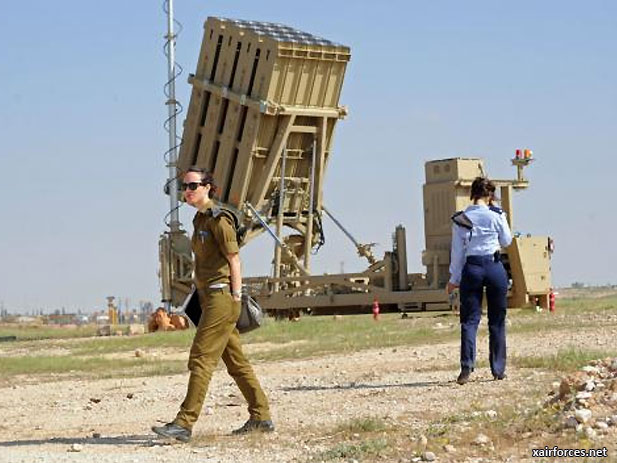
Israeli Rafael seeks to boost range of Iron Dome

Rafael Advanced Defense Systems is reported to be striving to boost the range of the Iron Dome counter-rocket system so it can intercept longer-range weapons.
This appears to be a stopgap measure to cover holes in Israel's planned multilayered missile defense system until David's Sling, another system under development by state-owned Rafael and the U.S. Raytheon Co., becomes operational, The Jerusalem Post reports.
The Israelis are focusing on technological upgrades for the system, as well as amending the operational doctrine of the air force, which has charge of the emerging missile shield.
Iron Dome, designed to counter missiles and rockets with ranges of 2.5-43 miles, is capable of determining which projectiles will hit populated areas and targets them.
Each interceptor, small rockets called Tamirs, cost $50,000-$100,000 which are usually fired in pairs to ensure a kill.
"This is significant since it would allow us to intercept more rockets with fewer batteries," a senior defense officer told the Post.
A modified system underwent a series of tests to determine the feasibility of using Iron Dome against longer-range missiles.
The air force currently has four Iron Dome batteries, each with three launchers armed with 20 Tamirs apiece. It plans to deploy another two in the coming months but military planners say as many as 20 batteries are needed to provide effective protection for the entire country.
On May 17, the Pentagon announced a quick-fix $70 million for Israel to buy at least two more Iron Dome batteries.
Israeli Defense Minister Ehud Barak said that would meet Israel's requirements regarding Iron Dome for fiscal 2012. That allocation is part of an overall package of nearly $1 billion for the missile defense shield Israel's putting together.
With both countries slashing defense spending because of global recession, there's talk of transforming Israel's development of missile defense systems by Israel Aerospace Industries and Rafael into jointly owned and managed ventures with U.S. defense companies that would give the Americans direct access to advanced Israeli missile technology.
Iron Dome is the only operational system in the world capable of intercepting short-range rockets and mortar shells, with a computer that can detect which incoming missiles will hit populated areas and disregard those that won't.
Barak disclosed that the United States, despite plans to cut defense spending by $600 billion in fiscal 2013, is discussing the possibility of setting up a multiyear budget with Israel under which it would purchase further Iron Dome batteries.
This will likely limit Israel's ability to export these systems, since the United States is able to veto sales of weapons systems incorporating U.S. components to foreign countries.
But, given the budgetary constraints the Israeli Defense Ministry is having to cope with, the Israelis no doubt welcome U.S. assistance, which is over and above the $3 billion they get in U.S. military aid every year
Israel's military and defense industry is under growing pressure to develop an inter-linked defense shield as Syria, Iran, Hezbollah in Lebanon and Palestinian hard-liners in the Hamas-ruled Gaza Strip amass large amounts of missiles and rockets.
Maj. Gen. Yair Naveh, the Israeli deputy chief of staff, told a Tel Aviv convention May 22 that the Iranian-backed Hezbollah now has an estimated 60,000 missiles and rockets, hundreds of them capable of hitting anywhere in Israel.
That's five times the number Hezbollah had at the start of its 2006 war with Israel, during which it unleashed nearly 4,000 missiles on northern Israel.
Brig. Gen. Itay Baron, commander of the Military Intelligence's research wing, told the Knesset's Foreign Affairs and Defense Committee a week ago that Syria and Iran have 3,500 large-caliber missiles aimed at Israel.
Iron Dome is designed to shoot down rockets and missiles with a range of up to 43 miles and has done so with some success since it made its combat debut in April 2011.
But there's no system for countering missiles with a range of up to 190 miles and won't be until David's Sling enters service in 2013.
The top tier is the Arrow-2, built by state-owned IAI to counter ballistic missiles at high altitudes. A more advanced variant, the Arrow-3, is currently under development by IAI and the U.S. Boeing Co.
Source: TEL AVIV, Israel, May 29 (UPI) - May 29, 2012 (upi.com)
Photo: Israeli soldiers stand near the Iron Dome, a new anti-rocket system, stationed near the southern city of Beersheba, Israel, March 27, 2011. The Israeli Defense Force deployed the $200 million Iron Dome system in response to dozens of rockets fired by Palestinian militants from Gaza in the past weeks. The Iron Dome is meant to protect Israeli towns from rockets fired from Gaza. UPI/Debbie Hill
(29.05.2012)
|